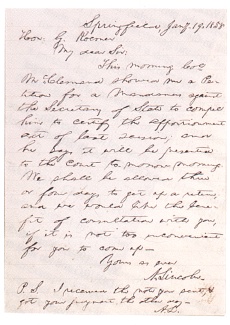American Autographs From Joe Rubinfine

American Autographs From Joe Rubinfine
Any good subordinate knows how to kiss the appropriate part of his boss' anatomy, and Oliver Hazard Perry was no exception. Perry would go on to be a naval hero in the Battle of Lake Erie during the War of 1812. In 1808 he wrote Commodore John Rodgers in support of more Congressional aid for the navy, but in a classic piece of buttering up the boss begins, "I hope from my not having previously written it will not enter your mind that it is possible for me to neglect you. No Sir, there is no one that...has more of my respect than yourself, a respect founded on my opinion of you as a professional Character - and what is more on your Character as a man - and I have the pleasing reflection of knowing that my opinion coincides with every officer of respectability on this station." I don't know what Rodgers reaction was to this letter, but if I had been him, I would have immediately made Perry an admiral. Item 15. $3,000.
Item 11 offers a candid and revealing look at the personality of George Washington. It is a letter written to a British merchant in 1818 by Bushrod Washington, Washington's nephew and U.S. Supreme Court Justice, who inherited Mount Vernon from his childless uncle. As a private and unadorned look at America's first leader by the person who probably knew him better than anyone but Martha, it is a rare opportunity to understand this great leader free from the embellishments that were mandatory for public pronouncements about him. What Bushrod reveals is a contemplative man, a good listener despite his enormous powers to tell others what they should think. "He was contemplative without the appearance of abstraction - reserved, without being austere, & taciturn, apparently from a desire to hear the sentiments of others rather than to express his own." Who was the last political leader about whom that could be said? "These traits, accompanied by native dignity of character by which he was remarkably distinguished, forbid every thing like familiarity even from his nearest relations, to whom he was nevertheless, always kind & affectionate. I never witnessed an act of levity committed in his presence by any person, nor did I ever hear opinions sported before him which were offensive to morality, religion or good manners. Altho he seldom spoke a great deal, yet his observations when he delivered them, were obviously the result of deep reflection, & were always marked with consummate wisdom." Bushrod goes on to say that his uncle could still relate highly amusing anecdotes, though never any which were inappropriate. Other traits Bushrod points out are that Washington was naturally high-tempered, yet had so learned to control it that no one would have suspected this. He answered all letters promptly, and accomplished more business in a period of time than anyone else his nephew ever knew. While president, he was familiar with the details of all matters of state, knowledge he obtained by receiving reports with the minutest of detail. Though born with a healthy appetite, Washington was temperate in his diet, and followed an early to bed, early to rise regimen. Those to whom we assign larger than life status are really just humans, possessed of human frailties, and ultimately may disappoint us. Washington was a remarkable man, one whose dignity and strength of principles support the enormous reputation his countrymen afforded him. $10,000.